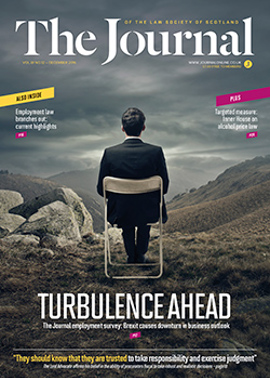Leisure – the serious side

Where do you come from, and what was your career path to your current position?
I’m from Paisley. I studied at the University of Glasgow, where criminal law and child law were among my favourite subjects – though they have nothing to do with what I do now.
I trained at Burness, with two seats in property, one in litigation and one in public sector. I enjoyed property and, as that was back in the days when you got your job well before you qualified, I was able to return to property for my last seat.
I worked at Burness quite happily over the next several years, though in 2009 I was in a pool for redundancy. Thankfully, I survived that. I was lucky that Burness had a wide variety of clients and was able to weather the storm during the recession. I did a lot of public sector work, working for urban regeneration companies for example, which picked up when the private sector dipped.
I had seen the G1 Group job advertised when the role was first created, about three years before I applied for it. At that time I thought it sounded quite interesting; I dealt with G1 on the other side of transactions, so knew a little bit about the company. I didn’t feel qualified enough at that time, and when it came up again just over two years ago, while I still thought it looked interesting, I hadn’t given it that much thought until my wife, who also works in-house, encouraged me to give it a go. The more I thought about it, the more it appealed to me.
How is your in-house legal team structured? What input do you have in strategy and governance?
It’s a small, nimble, boutique team. I’m the legal director and sole solicitor. There are two paralegals, one who does licensing and one who covers property and everything else. It’s still very “young” compared to some other departments in the company, but the team structure reflects just what we need.
I sit on the management board, which sits just under our main board. While we have this formal structure, if someone wants to know something they usually just come and ask me, so we operate quite informally.
Would you consider taking a trainee?
Not at the moment, mainly because we don’t have the infrastructure to look after them and give them a proper traineeship. It can be hard work, particularly when you’ve never had one before. I don’t see us taking on a trainee any time soon, though we have had people on work experience for a couple of days at a time.
What is a typical working day? What motivates you on a Monday morning?
I hate reading that “there’s no such thing as a typical working day” but, just like everyone else, I have to admit there is no such thing as a typical working day! I typically catch up with my team and with colleagues in operations and finance. I also have various regulatory tasks for our casino that involve some time each week. The rest of it just depends on what we have going on. Are we buying things? Are we leasing properties out? Do we have commercial contracts that need to be reviewed? And we have a tender cycle when many of our requirements are reviewed, so that needs covered too.
What was the biggest change for you when you moved in-house? What do you really enjoy about working in-house?
I really miss the banter and camaraderie of being surrounded by people the same age, same experience and doing the same thing. Now I’m in my own office and no one comes to speak to me as I’m “the big bad lawyer”! [He said, laughing.] I’ve got great non-legal colleagues but it’s nice to bounce ideas off other people who do the same thing as you.
I enjoy the variety of work and being able to do different things. I can look not just at property deals, which is my background, but also I’m able to spend time looking into other things and do that without worrying about the clock running or how much time I spend on it. I also enjoy finding out about the operational side of the business. For example, when you’re in private practice you generally only see the successful bids. You don’t see the number of properties that we look at or bid for that don’t succeed, because clients don’t want to pay for lawyers at that point. It was a bit of an eye-opener to see how all that works. There are things that we look at that are outside punts and there are things we look at very seriously – and we’ve had a number of successes recently, including buying pubs in Aberdeen and Edinburgh and a former cinema in Edinburgh that we are in the process of bringing back to life.
Has your organisation experienced any major change recently? What are the current hot legal topics in your sector?
Licensing laws continue to evolve. We have minimum pricing on the horizon, but that will likely affect off-sales more than the on-trade. Over the last few years the off-trade has increased its share of alcohol sales and the on-trade has decreased. Minimum pricing may encourage people to drink less at home and to drink more in pubs, where studies have shown people’s drinking is generally more sensible and they have the benefit of being supervised by trained staff.
The effect of Brexit remains to be seen. The impact on us will depend on the impact on the whole economy. People might tighten their belts. If Brexit affects the money in people’s pockets it may well affect us and everyone in the leisure trade.
We have seen more competition emanating from outside Scotland. Businesses in, for instance, America and England are looking at Scotland to expand. The leisure market continues to evolve.
Technology and social media have affected how people spend their money and how they interact with each other. Dating apps have affected the number of people visiting nightclubs, for instance. This means that when we buy properties and businesses we’re also looking at social media. As a property lawyer you might think that you’ve bought the property when you’ve bought the bricks and mortar and fixtures and fittings, but the intellectual property, the followers on Facebook or Twitter and Instagram need to be captured too, as that is a valuable part of the business.
What is your most unusual/amusing work experience?
We had a building which we leased out. The tenant, during its fit out, had workers staying on site. One of the neighbours complained that one of the workers opened the blinds every morning and then wandered around naked, much to her annoyance. She submitted a complaint and accompanied it with photographic evidence, which seemed completely unnecessary!
What makes a good in-house lawyer? What is your career advice for young lawyers who want to start an in-house career?
From my experience, moving to sole in-house lawyer, I probably couldn’t have taken on the role much earlier. You need to build up knowledge in what you’re doing and have the confidence to be able to work outside your comfort zone – that all comes from experience. You need to be able to speak to people at different levels, and this is very important. I could be speaking to the board one day and a chef or a venue manager the next day and you need to be able to temper what you say so that they understand your advice. I try and keep any written advice to a page or less. You also need confidence to give people advice they may not want to hear, and to gauge the overall risk appetite in the business and apply it to what you do. One of the big differences is, instead of being told what to do, there can be very general instructions and you have to figure out exactly what you need to do from there.
Is there anything you think the in-house sector/your sector does differently in the area of equality and diversity?
The in-house role perhaps has more scope for flexible working than traditional firms. In-house you have one employer to support how you work. In private practice you can have 15 different clients and, while 14 of them can support what you’re trying to do, the 15th may expect you to be there all night. It can be easier to manage what you do in-house with your employers’ support.
What keeps you busy outside the office?
I enjoy reading. Lee Child is a favourite, though I’ve not seen the films as Tom Cruise is not my idea of Jack Reacher! I enjoy travelling to new places and I’m the captain of my local Boys’ Brigade company.
What would you take with you to a desert island? What would you put in Room 101?
Plenty of books for the island, and sloppy drafting for Room 101 (and no doubt I will have this quoted back at me when I slip up).
In this issue
- FAI Rules: a guide to the consultation
- Saying sorry – is it enough?
- Repairing obligations for common parts
- Journal reader survey feedback report
- Reading for pleasure
- Tax: is your firm paying over the odds?
- Opinion: Judith Robertson
- Book reviews
- Profile
- President's column
- Altered deeds? Mind the rules
- The clouds gather
- Turning points: employment law into 2017
- Policy and the public interest
- Above the minimum
- Where code meets custom
- Child orders: mind the gap
- EU law, a family affair
- People on the move
- Information age?
- The limits of free web access
- Tenant farming: the new guidance
- Insolvency: cross-border clashes
- Foul play on the agency front
- Scottish Solicitors' Discipline Tribunal
- Comm prop and the Holy Grail
- Leisure – the serious side
- New anti-money laundering support
- Law reform roundup
- Brexit: helping to shape the outcome
- Transition to Lockton – your questions answered
- Expertise plus: promoting a sector strength
- Paralegal pointers
- Time to look back – and forward
- Everything comes...
- Ask Ash






